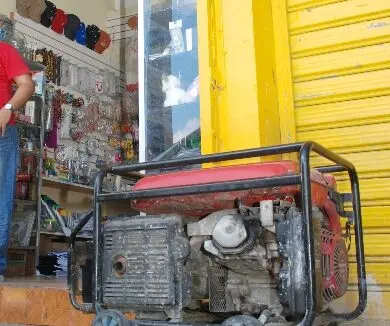The blackout crisis The crisis in the Dominican Republic has had repercussions among merchants and the general population. The situation is causing a state of despair throughout the country, with protests and demonstrations increasing.
The prolonged power outages severely affect merchants, who face significant economic losses due to the inability to operate their businesses efficiently.
In Barahona, for example, residents in 40 sectors report frequent power outages, which has led many businesses to temporarily close or operate at reduced capacity.
You can read: MIP will carry out a prevention campaign
Shop and restaurant owners are expressing frustration at not being able to keep products refrigerated or provide service to customers during extended power outages.
Luis Dipréa grocery store employee on Rafael J. Castillo Street in the La Fe district of the capital, complains about how “the lack of electricity affects business because many products are damaged. Sales also drop because there are no cold products, since people like their products very cold, and if there is no electricity, they do not get cold.”
For the general population, the blackouts also create an atmosphere of insecurity and unrest. At night, the lack of electricity leads residents to lock themselves in their homes for fear of robbery, while extreme heat without ventilation worsens sleeping and living conditions.
In the Juan Rafael Sur residential area, on Jacobo Majluta Avenue, “there are rounds of blackouts, although not as many as in other places,” he says. Jose Luis Soto.
The situation has sparked protests in various towns, such as Neiba and Barahona, where citizens have mobilized by burning tires and blocking streets to demand an immediate solution.
Amid this chaos, Celso Marranzini, president of the Unified Council of Electricity Distribution Companies (CUED), attributes the blackouts to a combination of factors, including the high demand for electricity exacerbated by the intense heat, as well as the age of some electrical substations, some of which date back to 1970.
According to Marranzini, these facilities are not equipped to handle current energy demand, contributing to supply instability.
The president of the CUED has asked the population to be patient while the government works on long-term solutions. He assures that the problem is not limited to poor management by the distribution companies, but also involves individuals with high economic power who steal electricity illegally.
He stressed that the Government is taking steps to address these irregularities and improve the situation.
He says that the Government, under the presidency of Luis Abinader, is committed to improving the management of the Electricity Distributors (EDE) and solving the structural problems that affect the electrical system.
He said the blackouts will continue until the improvements are implemented.















